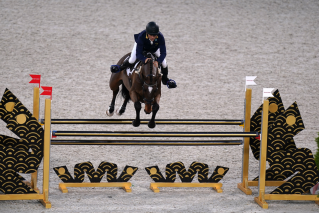US Olympic athlete files leaked in WADA hack


Serena Williams was among the US Olympians accused of doping. Photo: Getty
Russian hacking group Fancy Bears’ Hack Team has accessed the World Anti-Doping Agency database, leaking dozens of files allegedly relating to United States athletes on the internet.
Among the athletes targeted by Fancy Bears’ were Serena and Venus Williams, as well as teenage gymnast Simone Biles, who won four gold medals in Rio.
WADA confirmed the attack, condemning what it says are ongoing cyber-attacks that are being “carried out in an attempt to undermine WADA and the global anti-doping system.”

WADA director–general Olivier Niggli. Photo: supplied (WADA)
Director general Olivier Niggli said in a statement that WADA had been informed by law enforcement authorities that the attacks were originating out of Russia, by the group also known as Tsar Team.
“Let it be known that these criminal acts are greatly compromising the effort by the global anti-doping community to re-establish trust in Russia,” said Olivier Niggli said.
The International Olympic Committee also condemned the attempt to “tarnish the reputation of clean athletes”.
“The IOC can confirm however that the athletes mentioned did not violate any anti-doping rules during the Olympic Games Rio 2016,” it said in a statement.
WADA said it believes access was gained to its database through the phishing of emails via an IOC–created account for the Rio 2016 Olympics. At this stage it is thought the data gained is confined to the Rio games.
American athletes targeted
“After detailed studying of the hacked WADA databases we figured out that dozens of American athletes had tested positive,” the Fancy Bears’ group claimed on its website.

Simone Biles’ alleged WADA documents were leaked by the group. Photo: Getty
“The Rio Olympic medalists regularly used illicit strong drugs justified by certificates of approval for therapeutic use,” it said. “In other words they just got their licenses for doping. This is other evidence that WADA and IOC’s Medical and Scientific Department are corrupt and deceitful.”
Former Australian Anti-Doping chief Richard Ings, however, tweeted that the findings released by Fancy Bears’ showed Therapeutic Use Exemption (TUE) files that were not in themselves incriminating.
US investigative journalist TJ Quinn from sports broadcaster ESPN said on his Twitter page there was nothing in the documents that suggest anyone did anything wrong. “Besides the fact that someone hacked the documents.”
3 was treated with CORTICOsteroids for injuries. People will see "steroids" and flip out, but these are NOT muscle-building anabolic drugs.
— T.J. Quinn (@TJQuinnESPN) September 13, 2016
The entire Russian athletics team was barred from competing in Rio after systemic doping breaches were exposed earlier this year.
Since then, several hacking groups have threatened to hack WADA.
“As predicted, the USA dominated the 2016 Olympics medal count with 46 gold, 37 silver, 38 bronze for 121 total,” Fancy Bears’ said. “The U.S. team played well but not fair.”
The group said artistic gymnast Biles was one of the “American doping athletes”, linking 13 files it said support its claims.
USA Gymnastics statement regarding Simone Biles and WADA hack: pic.twitter.com/YTq2iVS7Vu
— USA Gymnastics (@USAGym) September 13, 2016
Fancy Bears’ also accused tennis stars Serena and Venus Williams of various breaches, claims that were strenuously denied (see below).
Venus Williams releases a statement in response to today's hack of WADA which leaked her (+Serena's) TUE records: pic.twitter.com/z2RAVNt6fM
— Ben Rothenberg (@BenRothenberg) September 13, 2016
“This is just the tip of the iceberg. Today’s sport is truly contaminated while the world is unaware of a large number of American doping athletes,” Fancy Bears’ said, promising to continue leaking WADA documents.
Ings said on Twitter that in 2014 and 2015, the Australian Sports Drug Medical Advisory Committee approved 234 TUE’s for medical use of banned substances. “Normal stuff.”
Content of the FancyBear hack does not trouble me. Standard TUE stuff. What troubles me is the failure to protect athlete medical records
— Richard Ings : Renewable Energy Beneficiary (@ringsau) September 13, 2016
WADA issued a scathing report on the Russian government’s systemic cover-up of doping during the Sochi Winter Olympics in 2014 after Grigory Rodchenkov, a doctor who had worked for Russia’s own anti-doping authority, said he helped cover the tracks of athletes using anabolic steroids during the games.
The Guardian last month reported that cybersecurity researchers at ThreatConnect believed Fancy Bears’ was responsible for defacing the WADA website after the Russian athletics team was banned from Rio.
It said Fancy Bears’ breached WADA in apparent retaliation against whistleblower Yuliya Stepanova, the Russian sprinter who spoke out against her country’s doping.
ThreatConnect was quoted as saying Fancy Bears’ was long suspected of having ties to Russian security agency GRU.
The Kremlin “completely excluded” the involvement of Russian secret services in the latest hack.
“I can say unambiguously that there can be no mention of any involvement of Moscow, the government, any Russian services to activities of this nature,” Dmitry Peskov, a spokesman, was quoted as saying by The Financial Times.








